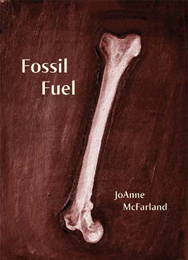Review: FOSSIL FUEL by JoAnne McFarland

Fossil Fuel
JoAnne McFarland
2007
Gold Leaf Books
66 pages
Review by HEATHER DUERRE HUMANN
Fossil Fuel, JoAnne McFarland’s sixth poetry collection, begins with her borrowing a saying attributed to the 13th century Persian poet and philosopher Rumi: “if there is hunger / if there is famine / show me your harvest / show me your resource.” This epigraph is fitting, for it anticipates the book’s organizational structure: Fossil Fuel is divided into “Resources” and “The Harvest,” two sections which link up in name and theme alike to Rumi’s proverb. Even more significantly perhaps, this epigraph also suggests what is at the core of Rumi’s teachings—in essence the notion of tawhīd, meaning union with the primal root from which one has been cut off and become distant and the longing and desire to restore it—a concern which many of the selections within Fossil Fuel share.
This longing to reconnect with things of (or from) the past emerges in “Burial Grounds,” the first poem appearing in the collection. Here, McFarland describes how, for the poem’s persona, the act of unearthing “a 40,000 year old bead” links her to “the world before her / […] beneath her feet / […] upon which an ancient people gathered.” Another selection, “Fossil Fuels,” is about a more personal kind of history: “I dream I no longer a woman / no longer human / […] I am / Child of no one / […] My ancestors were slaves / […] Now I lay me down on your guilt / Now you lay yourself down / on my shame.”
Another interesting facet of this collection is that McFarland experiments with a variety of perspectives and uses a range of (sometimes competing) narrative voices in these poems. Several of the selections within Fossil Fuel have a two-voice form. For example, in “See-through,” one voice provides a vivid description of a cityscape, which is nicely complemented by a second voice conjuring lush images of romantic love and desire. Similarly, in the politically-charged and timely “Loveness’s Lament,” a poem about the AIDS epidemic in southern Africa, McFarland addresses the issue as it affects an individual woman (Loveness) as well as women as a group.
Finally, it is worth noting some biographical details about McFarland because they are far from incidental to a discussion of this collection. In addition to being a poet, she is also a collage artist and painter. The fact that McFarland is a visual artist—and possesses an artist’s keen eye and ability to create a whole picture through precisely chosen details—emerges in many of her selections. Her focus on the visual is also evident in her decision to include several black and white photographs of dig sites and other things archaeological in this collection.
This attention to the visual is a feature which enhances this collection. Not only does it mesh well with McFarland’s narrative style, but it also heightens the reader’s sense that everything in Fossil Fuel has been carefully thought-out. Indeed, McFarland displays both her precision and maturity as a poet in this collection. Consequently, Fossil Fuel is, all-in-all, a worthwhile and interesting read.